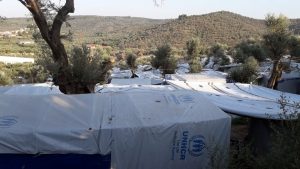
With over 8000 individuals living in Moria Camp, in Lesvos, it is at the highest population since the implementation of the EU-Turkey deal. Despite media fatigue, the resultant inhuman conditions have gained renewed international attention due to the extremity and desperation of the current situation. Tensions are high, and it is no surprise that this has led to increased flights and clashes in Moria. Rather than look to the root causes of these tensions, following clashes and fights in Moria, police are demanding from leaders in Moria Camp that they turn over to authorities individuals for criminal prosecution. Community leaders have been held by police during recent fights, throughout the night, and threatened that they will themselves face criminal prosecution if they refuse to give over names to the police.
This is not the first time the police have targeted community leaders. Following riots in Moria Camp in July 2017, one individual from Mali who was actively organizing to defend migrant rights was arrested and charged with arson, and was prevented from leaving the island of Lesvos until he was acquitted of all charges in his May 2018 trial. Eight individuals who were arrested in March 2018 will face trial for clashes with the police in Moria Camp in a few months. At least two of these individuals have alibi witnesses who confirm they were actually helping people who were injured in the clashes and by police use of tear gas, rather than taking part themselves, and sources have confirmed that the eight were arrested after being identified by the then Iraqi community leader.
The role of community leaders in Moria Camp, which involves appointment using various methods across different nationalities – and approval of the individual by authorities – is itself unorganized and leads to many different personalities filling this often thankless and exhausting position. The targeting of community leaders by police is dangerous both for the leaders, and migrant communities themselves, who are represented by individuals who have been forced into the contradictory role of both advocating for the rights of those forced to live in Moria Camp, and collaborating with the authorities who have created and administer the Camp. If the authorities truly want to hold individuals responsible for predictable tensions that lead to frequent fights and clashes in Moria Camp, they should not contribute to tensions within Moria Camp by using leaders against each other and against members of their communities. If anyone is responsible for the violence in the Camp, it is the Greek government’s violent policies of repression against those who stand up for their rights, and the hostile EU policies of containment and exclusion, which prevent people from leaving Lesvos and continuing their journey to the European continent.
